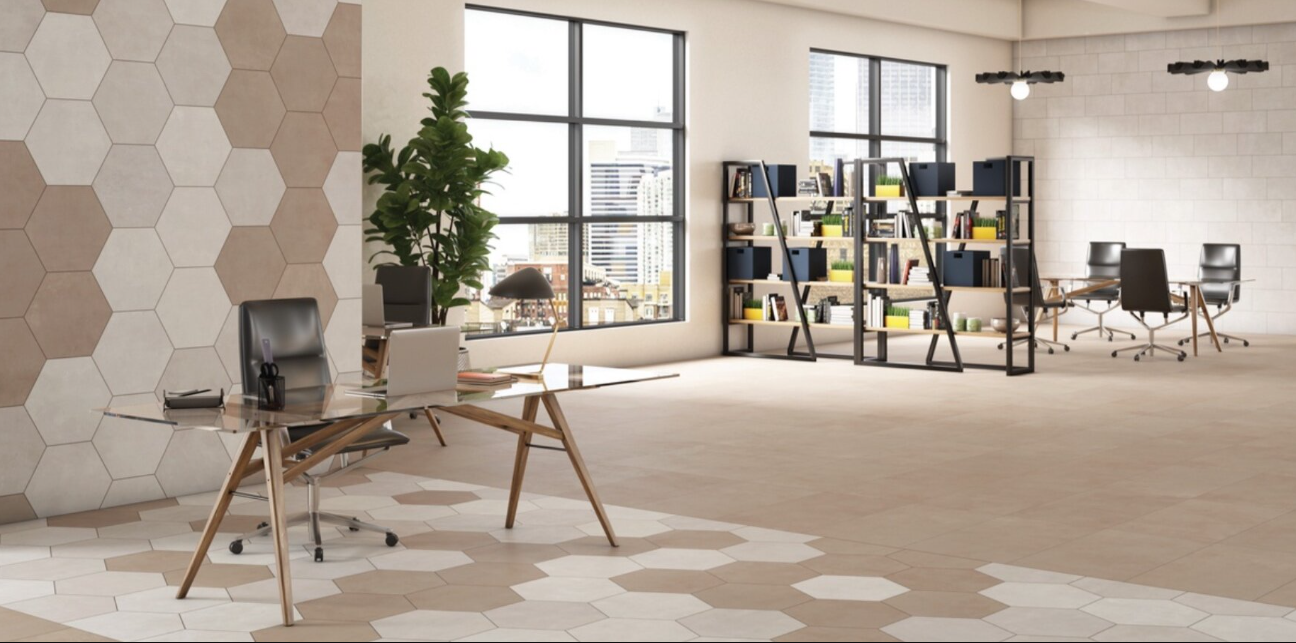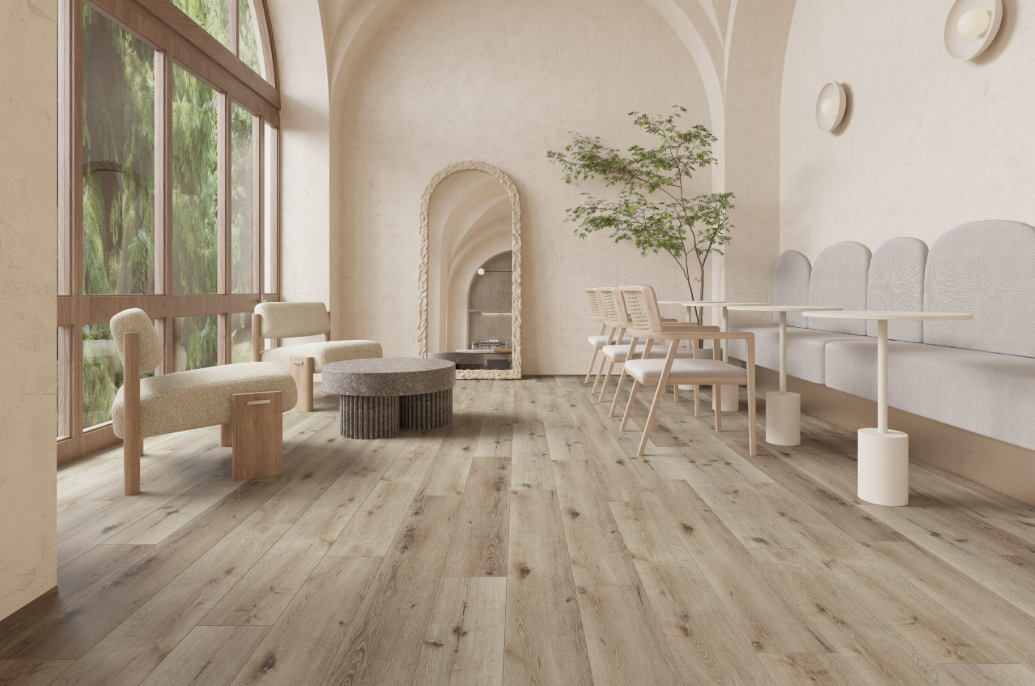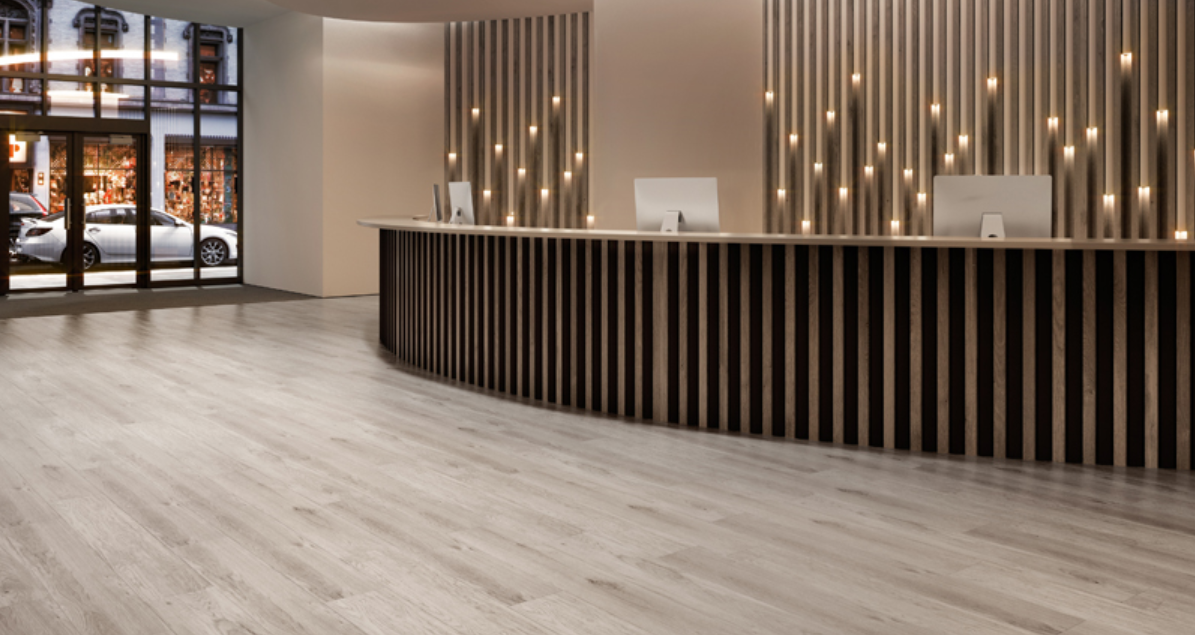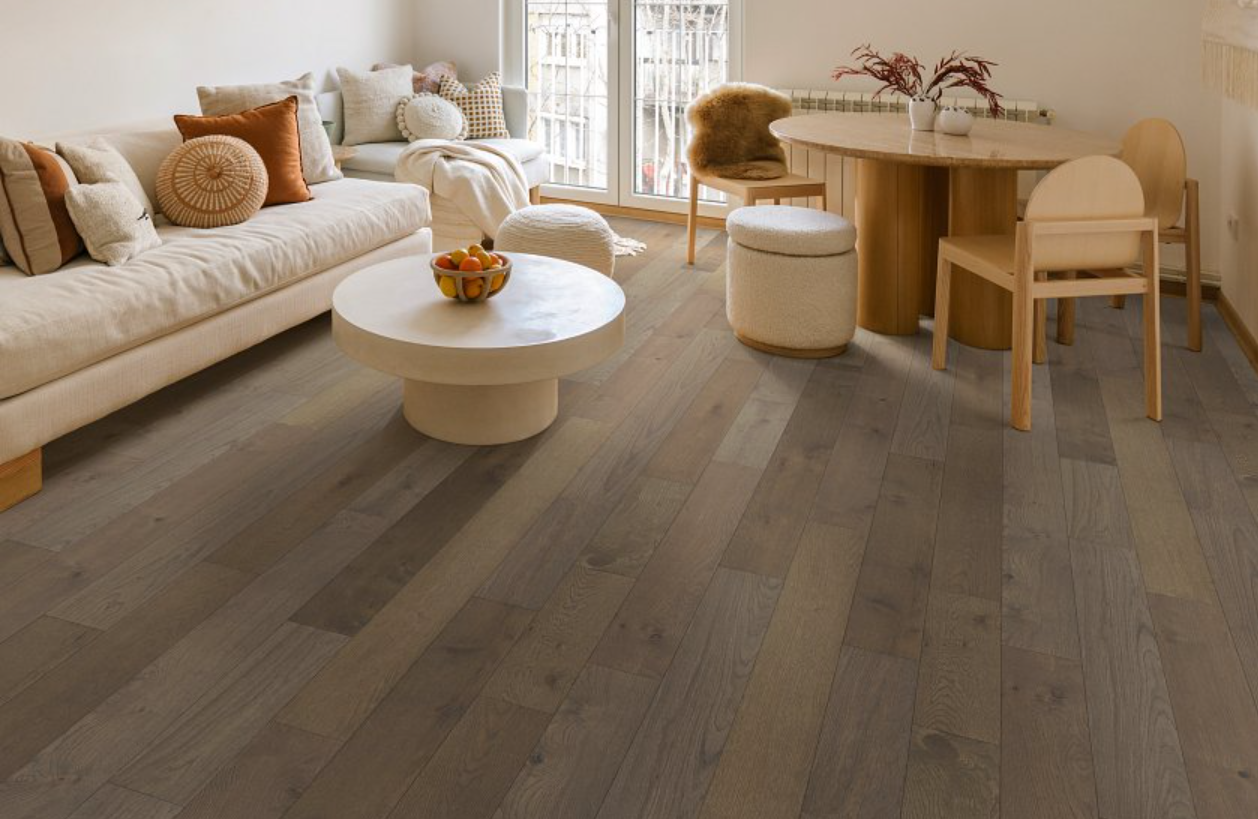Choosing the Right Flooring for Halls And Entryways
Entryways take a beating every single day. They’re the first thing anyone sees, and they get hammered by foot traffic, weather, even pets tracking dirt in. So when it comes to flooring here, it’s not just about looks — it’s about picking something tough, water-resistant, and easy to clean.
If a floor can’t handle the hustle, it’s just going to look worn out fast, and that’s bad news for any project. This guide lays out the key things to think about when choosing floors for busy entryways. From solid tiles and vinyl to engineered hardwood and natural stone, knowing your options means you pick the right floor that lasts, looks good, and fits the budget.
If you weigh these points—durability, water resistance, maintenance, style, and cost—I’m confident you will find flooring that stands up to everyday life and gives your guests a wonderful welcome.
Porcelain and Ceramic Tile: Durable, Low-Maintenance Options for Entryways

If you need a tough, long-lasting floor for your halls and entryways, I think porcelain and ceramic tiles are excellent choices. They work particularly well in busy areas where you need a floor that can last.
Unmatched Durability for High-Traffic Areas: From our experience at Baier’s sales team, porcelain tile stands head and shoulders above the rest when it comes to durability. Fired at extremely high temperatures, this dense material handles heavy foot traffic, dropped tools, and even shifting furniture like a champ. We’ve seen it perform flawlessly in busy commercial spots like airports and malls, taking thousands of steps daily and still looking sharp years down the line. Ceramic tile is solid too, but for entryways with nonstop heavy use, it can chip or crack more easily.
Superior Resistance to Moisture, Scratches, and Stains: Porcelain is our go-to recommendation for entryways because it’s almost impervious to water, with a water absorption rate below 0.5%. Muddy boots, spilled drinks, wet shoes — no problem. It resists warping and stains where other floors would buckle. Plus, its tough surface fights off scratches from dirt, grit, and pet claws, keeping it looking fresh much longer than softer floors. Ceramic tile does a good job too, with water resistance between 3–7%, but for heavy-duty entryways, we suggest occasional sealing to keep it protected.
Simple Cleaning and Minimal Upkeep: Both porcelain and ceramic tiles make life easy when it comes to maintenance. A quick sweep and mop keep them looking great — no fancy cleaners needed. Porcelain usually doesn’t need sealing, while ceramic might benefit from it every now and then, but it’s nothing too demanding.
Versatile Design and Style Options: One thing we love selling is how porcelain tiles can mimic just about anything — high-end marble, natural stone, wood planks, even concrete. There’s a huge range of finishes, textures, and slip-resistant surfaces to match any style or project need. Ceramic tiles offer plenty of choices too, though they don’t quite match the detailed patterns and premium finishes porcelain brings to the table.
LVP/LVT: My Go-To for a Waterproof, Tough, and Stylish Hall&Entryway Floor

For entryways and busy halls, I often recommend Luxury Vinyl Plank (LVP) and Luxury Vinyl Tile (LVT). In my experience, they mix great strength with modern style. This makes them a perfect fit for active areas where spills and messes are common.
Built Tough for Busy Spaces: At Baier, we’ve seen firsthand how LVP and LVT flooring stand up to heavy use. The secret’s in the layers—especially that tough polyurethane wear layer, which can be anywhere from 6 to 20 mm thick. This layer shields the floor from scratches, dents, and stains. For places that see nonstop traffic like offices, schools, or hospitals, we always recommend the commercial-grade 20 mm option. It holds up under constant wear and tear without losing its look.
Amazing Waterproof Protection: One thing we always highlight to our clients is how completely waterproof LVP/LVT is. Muddy boots, rain, spilled drinks — none of it gets through. That waterproof barrier keeps floors from swelling, warping, or staining, which you just can’t say about hardwood or laminate. For entryways and busy spots, this makes a big difference. In most vinyl flooring production lines, waterproof performance can be fully guaranteed.
Comfortable and Quieter, Too: We also tell buyers that LVP/LVT isn’t just tough—it’s comfortable underfoot. Thanks to its flexible core and optional built-in underlayment, it feels softer and warmer than tile or stone. This is a big plus for homes with kids or pets and great if barefoot walking is common. Plus, it helps cut down on noise, reducing that echo you get in large open areas.
Easy to Clean and Resists Fading: Cleaning is no hassle. Just a quick sweep and mop, and it looks fresh again. No need for special cleaners or refinishing. The color holds up well too, resisting fading from sunlight. That’s why we often recommend it near doors and windows where the sun shines in strong.
Fast and Flexible Installation: Installation is a breeze, whether it’s click-lock planks or glue-down tiles. Both methods go in fast, and traffic can get back on the floor almost right away. For busy entryways or commercial spaces, that quick turnaround is a huge advantage.
From my experience, I believe commercial LVP/LVT is a smart choice. You get a modern entryway floor that handles the demands of a busy home. You don’t have to worry about water damage or a lot of maintenance.
Laminate Flooring: Durable and Affordable for High-Traffic Entryways and Halls

From my experience, laminate flooring is a very smart choice for hallways and entryways. It’s a great option if you need something durable, good-looking, and valuable. Its design is meant to handle the challenges of busy spaces with lots of foot traffic.
Built for Durability in Busy Areas
Engineered Strength Built In: Baier’s laminate flooring features a tough wear layer that protects against scratches, dents, and heavy foot traffic. For commercial and entryway use, we recommend an AC3 rating or higher, with AC4/AC5 for extra durability.
Recommended Thickness for Stability: We suggest at least 10mm thickness for high-traffic areas to ensure stability and a solid feel. This is ideal for contractors, distributors, and bulk buyers needing reliable performance. And because Baier has its own MDF/HDF factory, commercial-grade laminate flooring of any thickness can be customized.
Long-Lasting Performance: With proper care, Baier laminate flooring lasts 15–25 years, perfect for homes and commercial projects. Our products deliver durability and value for long-term flooring solutions.
Baier’s Advantage: As a leading laminate flooring supplier and manufacturer, Baier offers consistent quality and competitive pricing. We provide tailored OEM and bulk solutions to meet B2B clients’ specific needs.
Low Maintenance, Big Reward
I find laminate flooring very simple to care for. You just need to sweep or vacuum it regularly and sometimes use a damp mop. You don’t need to refinish or polish it, which is a big plus compared to natural hardwood. Its stain-resistant surface handles spills better than plain wood or carpet. This makes cleanup quick and stress-free.
Resistant to Scratches, Stains, and Moisture
Scratch-resistant: Our laminate’s tough top layer takes a beating—shoes, pet claws, furniture—you name it, it resists scratches like a champ.
Stain-resistant: Mud, spills, no sweat. Just wipe it clean and it looks good as new.
Water resistance: Standard laminate can’t handle water well, so we push our water-resistant options—perfect for entryways where wet shoes and umbrellas are daily business.
A Cost-Effective Solution
Laminate flooring offers the natural look of wood, stone, or tile at a budget-friendly price, making it ideal for entryways. Baier’s laminate combines style, durability, and affordability—perfect for contractors and bulk buyers seeking cost-effective flooring solutions.
Expert Opinion:
“From my 15 years of installing floors, I’ve found that laminate is a great option for busy entryways. You just have to pick the correct type. It’s important to know that laminate quality varies. For entryways, I suggest using products with an AC4 or AC5 rating. I also recommend a thickness of at least 10mm. My clients are impressed that modern laminate can look like expensive hardwood or stone. It costs much less and is still strong enough for heavy foot traffic.”
———— Yu, Senior Flooring Specialist at Baier Floor Solutions with 15+ years in residential and commercial installations
Engineered Hardwood: A Strong and Stylish Choice for Your Hall&Entryway

From my experience, engineered hardwood is a great choice for busy hallways and entryways. It gives you the classic look of real hardwood. But its special layered design makes it much more durable than solid wood.
Why I Recommend Engineered Hardwood
Very Stable: I like that engineered hardwood has a strong core. It’s made of plywood or HDF layered in different directions. This design greatly reduces swelling, shrinking, and warping from weather changes. Solid wood often gets damaged by this, especially near doors.
Real Wood Surface: The top layer is genuine hardwood, so you get the real look and feel of wood. I suggest getting a veneer that is 2 mm or thicker. This allows you to sand and refinish it at least once, making it last even longer.
Protective Top Coat: Most floors have a tough coating like polyurethane or aluminum oxide. This finish protects against scratches and stains. It holds up well to scuffs from shoes and pets in your entryway.
Proven Performance and Value
Lasts a Long Time: Many of these floors have warranties of 30 to 50 years. This shows just how tough they are for busy homes.
Resists Moisture: Engineered hardwood is much better with spills and dampness than solid wood. It can handle tracked-in water and humid air. I’ve found it’s a great option for basements or homes with underfloor heating, where solid wood isn’t suitable.
Easy to Clean: Upkeep is simple. Just sweep and use a damp mop. You won’t need any special cleaners, which I think is a big plus.
I suggest engineered hardwood because it combines good looks, stability, and toughness. This makes it a fantastic choice for any busy hallway or entryway.
And I Recommend Rubber Flooring for Your

For a floor that can handle the heavy use in your hallways or entryways, I recommend rubber flooring. It’s a popular choice for both commercial buildings and homes that have constant foot traffic.
Built to Last in Busy Areas
I’ve found that rubber flooring resists damage from shoes, dropped belongings, and even rolling strollers. It absorbs shock well, so it doesn’t dent or crack like some harder floors. If you have kids running inside with sports gear or lots of guests, this floor holds up. From my experience, a quality brand will last 10 to 30 years if you keep up with simple cleaning.
Resists Moisture and Cleans Up Fast
A big benefit is its strong moisture resistance. Entryways often get wet from rain or snow, but rubber flooring won’t warp or absorb the water. Most spills sit right on top. You can mop or wipe them away in seconds. I think this makes it a solid pick for families with pets or for anyone living in a wet climate.
Comfort, Safety, and a Quieter Home
One of the things I like most is the comfort underfoot. When you spend time standing in the hall sorting mail or taking off shoes, rubber feels softer than stone or tile. It is also slip-resistant, which means there’s less risk of falling when your shoes are wet. I’ve noticed it makes busy entryways quieter because the material absorbs the sound of footsteps and echoes.
Quick Comparison: Which Flooring is Right for Your Flooring Project?
When you’re picking a floor for your hall, you have to weigh a few factors. Based on my experience, you should consider durability, water resistance, comfort, upkeep, and cost. I made this simple comparison chart to help you feel good about your choice.
| Flooring Type | Lifespan (Years) | Water Resistance | Comfort | Maintenance | Notable Features | Price Range* |
|---|---|---|---|---|---|---|
| Porcelain Tile | 20–50+ | Excellent | Low | Low (simple to clean) | Lasts longer than most floors, waterproof, very scratch-resistant | $3–$10/sq ft installed |
| Luxury Vinyl (LVP/LVT) | 10–25 | Very Good | Moderate | Very Low | Waterproof, absorbs sound, slip-resistant, great for busy homes | $2–$7/sq ft installed |
| Laminate (AC4 or AC5) | 10–25 | Moderate | Moderate | Low | Scratch-resistant, a good value, not for heavy moisture | $2–$6/sq ft installed |
| Engineered Hardwood | 15–30+ | Moderate | High | Moderate | Looks like real wood, needs refinishing sometimes, handles some moisture | $5–$12/sq ft installed |
| Berber Carpet | 10–15 | Low | High | Medium | Hides dirt, feels comfortable, has durable loops, perfect for warmth | $1–$5/sq ft installed |
| Aussieplank Hybrid | 10–25 | Very Good | Moderate | Low | Mixes laminate and vinyl perks, 0.7mm wear layer for tough use | ~$4–$8/sq ft installed |
*These are estimates based on 2024 industry averages. Actual prices can change with your location and installation costs.
Flooring Highlights for Halls and Entryways
Porcelain Tile: It can last 20 to 50 years or more. I find it’s the best for toughness and water resistance. It handles wet shoes, mud, and impacts. It won’t warp or chip.
Luxury Vinyl (LVP/LVT): This is waterproof and simple to care for. It can last up to 25 years. It’s also quieter, softer, and warmer than tile. I recommend it for homes with pets, kids, and messes.
Laminate (AC4/AC5): This option is affordable. It resists scratches and normal wear. It’s not the best for lots of moisture. Still, new water-resistant types are fine if you clean spills fast.
Engineered Hardwood: I love that this gives you the warm, beautiful look of real wood. It has added stability. It can handle moderate moisture and foot traffic but will need resealing now and then.
Berber Carpet: This is very comfortable under your feet. Its tight loops are durable and hide dirt well. It’s great for families who want warmth. It is less resistant to heavy water and wear.
Aussieplank Hybrid: This has a 0.7mm wear layer. That means it offers top-notch protection from scratches and dents. It gives you the water resistance of vinyl with the solid feel of laminate. I think it’s perfect for a busy house.
Summary
So, for the best flooring for halls and entryways, I recommend you focus on durability, water resistance, and ease of maintenance. Think about what your home needs. Do you want something easy to clean, warm, tough, or stylish? This will help you choose a floor that will look great and hold up for a long time.
